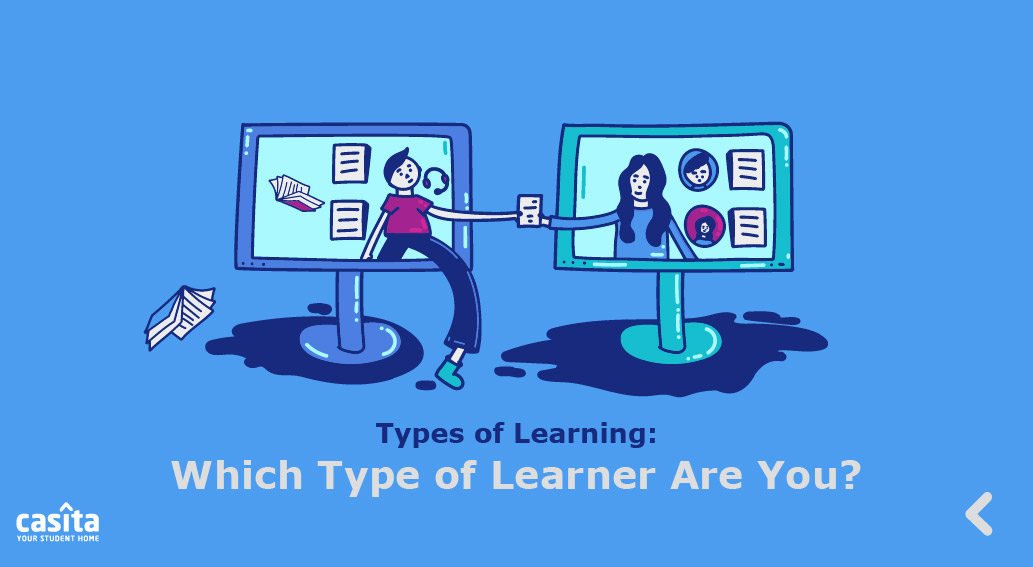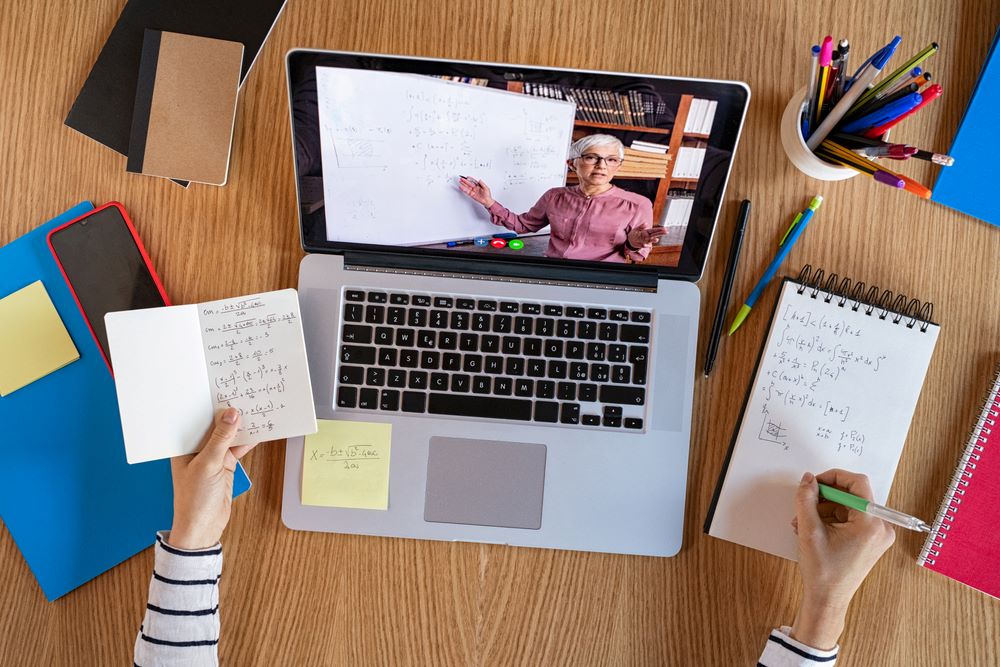Types of Learning: Which Type of Learner Are You?
Tips and Advice
University Life
7 mins read
Share

Updated at: 16 December, 2024
Published at: 28 February, 2020
By Hagar Samir
Types of Learning: Which Type of Learner Are You?
Tips and Advice
University Life
7 mins read

Updated at: 16 December, 2024
Published at: 28 February, 2020
By Hagar Samir
Share
Learning anything is a process that takes time, effort, and patience. A lot of people don’t really understand that learning is different from studying and that in order to learn, you have to both study and understand. Studying is just taking something and maybe jotting down some notes to prepare you for understanding. Learning also takes a lot of practice since it’s a more active exercise that needs hands-on experience!
If your plan is to learn, you’re going to have to know the different types of learning first. Sometimes people find themselves failing at learning something despite several tries; that is mainly because they don’t know the learning ways and types of learning. In order to understand something completely, you’ll have to know which type of learner you are and work on yourself using that!
Scientifically speaking, there are nine types of learners out there, but this doesn't mean that a person can only belong to one kind! An average learner will belong to at least two or three types, and the percentage of each one will vary. What we can all agree on is that one type will be dominant, and the other sub-types will appear under particular circumstances.
Also, your learning type is affected by your environment, mood, people around you, and character traits. By being aware of the types of learning and knowing your own learning type, you'll know how your brain learns best during your university or college years!
Types of Learners
1. Visual Learner
This type of learner relies on their eyes; they remember, understand, and learn what they can see and read! If you mostly remember best what you see, you're probably a visual learner. The best studying methods for you as a visual learner include:
Skimming, scanning, and reading your study material from one source. Distracting yourself by using a lot of things will only make it harder for your eyes to get used to one layout.
Try to draw theoretical subjects and transform them into stories or presentations, or write them down yourself! If you can find videos creatively showing the material, it'll definitely work for you!
Focus on monitoring yourself while working so your eyes are accustomed to the task at hand. For example, if you're in a chemical lab, concentrate on the colours of the solutions and the shapes of the tubes you're using. You're more likely to remember better this way!
It's better to know that if your primary learning type is visual, your other two subtypes are likely kinesthetic and scribble, and both will be explained below in detail! You're the best when it comes to time management because you can see the big picture in your head in less time!

2. Stress Learner
Are you a last-minute learner, although you're stressed out because of the exams from the very beginning of your semester? We've all been there! Procrastinating puts a lot of pressure on us, especially when it’s an important exam! However, some students learn best when they’re stressed. If you're overly stressed, your best studying methods as a stress learner are more psychological and are as follows:
Keep yourself motivated by always having a future goal to look up to.
A healthy lifestyle is strongly recommended. Work out or take walks during your study breaks. It helps you release any negative energy and let go of negative thoughts. Make sure your sleeping habits are healthy and fixed!
Whenever you feel stressed, try to learn more about the subject you're worried about. You can also talk to professors and seek guidance on how to study better.
Group studying could make you feel a bit better, but know when you need to be studying alone.
If distraction is a stressor, there are several study hacks to avoid distractions and increase your attention span!

3. Kinesthetic Learner
On top of the list of learning ways is kinesthetic learning! These learners are practical and energetic. They don't dip their toes; they dive in! They not only learn by doing but also by actually trying to do something. However, if they don’t achieve what they want on the first try, they work and work until they master it! When you're studying, if the information is mostly associated with images and techniques, you're a kinesthetic learner. Your best studying methods as a kinesthetic learner who learns by doing are as follows:
Try as much as possible to practise what you are learning. For example, if you're a history student, other than reading history books or watching documentaries, get down to a museum to be more involved in the lives of the people you're learning about!
Your primary skill could be visual, so if the doing part is inapplicable, try watching some videos too!
The best university majors for this type of learner are mechanical, medical, nursing, applied arts, etc. These majors depend mostly on trying and practising, which is perfect for a kinesthetic learner!
4. Auditory Learner
These learners have a vast imagination, as their brains can easily translate whatever they hear into creative images and sometimes storylines. They also start to understand it in their own way by imagining what is around them. Your best studying methods, if you're an auditory learner who learns by hearing, are as follows:
Record your lectures and listen to them later at home. Skip jotting notes down quickly and stop trying to follow up with your professors' fast pace of lecturing. You can start taking notes at your own pace when you listen to the lecture in order to get as much information as possible.
Record yourself while explaining difficult material to yourself instead of writing it down in notebooks. Listen to them over and over again before your exams!
Try to find as many videos as possible on the subject from a wide range of sources.
Most likely, your minor learning type is teaching, so group studying and explaining the material at hand to your university colleagues will actually make you learn and remember it better. There are a lot of group brainstorming techniques you can learn to help you get better! Your other minor could be visual too! So scroll up and make sure you use a variety of methods to learn better and better!

5. Ease Learner
Ease learners are the exact opposite of stress learners; they learn best when they’re relaxed, and they don’t like procrastination! They're more likely to take some time to decide on their university major, as they would want to be 100% sure that this one won't stress them out so they can study. Here are the best studying methods for you as an ease learner:
Break down your study material into small chunks instead of bulky ones.
Draw yourself a mindmap so you can know the corners and edges of your whole study plan and schedule.
You're more likely to be a scribble and trust learner, which will also be explained, so make sure to write your study material yourself and seek guidance from the colleagues you trust. Go to the library and familiarise yourself with credible sources; this will make you believe in what you're studying more and help you end up studying better.
6. Scribble Learner
One of the most common learning ways is by scribbling. So, when in doubt, write it out! This learner's most peaceful and cherished time is when left alone to write what they understand from their lectures in their notebooks. They're more likely to be great visual learners as well, because scribbling is not only limited to writing but also includes doodling and drawing! It’s important to know what else each type of learner can use to help them learn better. These are the best studying methods for scribble learners you should be aware of:
Start with writing; writing what you understood from the lectures will help you remember and understand better.
Doodling also helps a lot if you’re a scribbler! You can write stories out of anything you're trying to study and draw them on a timeline.
Being a scribble learner means that you’re also a visual learner. So, a great tip is to read a lot about the subject at hand but stick to only one source to avoid confusion.
If you’re a night owl, there are some great tips you should follow to study better!

7. Copy Learner
Copy learners are really unique because they learn best when they copy something or someone. This type of learning helps people become actors or make outstanding voiceovers! If copying is your learning style, group studying is probably the most effective study method for you.
It’s preferable to have a friend with you to show you how they’re studying so you can copy them. Visuals are also a great plus because when you watch something closely, you imitate it better! This type of learning, out of all the learning ways, requires someone with talent and a good memory.
8. Teach Learner
If you learn best when you teach someone something, then you’re probably a teach learner. You can even just say the words out loud and pretend that you’re teaching someone! The best studying method for you as a teacher-learner is to roam around your room and read the material out loud like you're prepping yourself. Your primary learning type is probably auditory, so reread it carefully.

9. Trust Learner
The last type of learning is trust learning. These learners' strengths lie in their high research skills. They tend to research any piece of information they come across and want to find as many credible sources as possible for the subjects they're trying to study.
This makes them learn better because searching for something on their own makes the information stick better. If you're like that, get a library membership and your notebooks, because you've got a lot to do. The best studying methods for you as a trust learner are as follows:
Befriend your professors and write down all the sources and references they think you should be reading.
Watch various videos from reliable sources about the subject you're trying to study.
Remember that you’re probably a kinesthetic learner, and this is only a secondary type of learning to help you!
All of these learning types will help you learn and understand your curriculum better. It’s important that you know how you study and how well your brain responds to each type in order to get the most out of each and every study session. So, once you know what type of learner you are, you’ll start studying accordingly. Good luck!
Frequently Asked Questions
1. What are the different types of learning?
There are nine types of learning; you can be more than one learner at the same time! These types include:
Visual
Stress
Kinesthetic
Auditory
Ease
Scribble
Copy
Teach
Trust
2. Can I learn in two different ways?
Yes! There are so many people with more than one learning type. You can be someone who learns both visually and auditorily. You don’t have to pick and choose only one type.
3. How do you identify learner types?
If you want to know what type of learning suits you best, you have to know how you understand best. You can start by using different learning approaches that work well for you, such as writing out notes, creating mind maps, using models, or reciting out loud. After that, you choose what works best for you and stick to it.
Tips and Advice
University Life
By Hagar Samir
Share
Tips and Advice
University Life
Updated at:
Published at:
By Hagar Samir
Share





